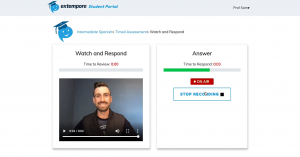
Preparing students for an AP language class before they take AP
If you teach AP, you probably do some AP-type activities with your Spanish 3 and 4 students as well. You know that preparing well for the AP test takes longer than a few months, so you make sure your lower levels are already engaging with the thematic vocabulary and the type of authentic tasks they will work with when they get to your AP course.
If you do not teach AP but would like to use the AP exam (and the college credit that may come with it) as a motivating goal, you may be wondering how to best work with your students so they feel confident they can take an AP course.
The number one recommendation: focus on speaking from level 1.

Almost invariably, for students who are not heritage speakers of the language, the most challenging AP tasks are the spoken responses: the simulated conversation and the cultural comparison. Speaking tends to be the least practiced skill in language programs for several reasons: emotions (self-consciousness that leads to task avoidance), classroom dynamics (behavior issues that make class get too out of hand during interactive tasks), or time constraints (speaking tasks traditionally happen only in the classroom). Extempore is a helpful tool that can be used to overcome these common hurdles in language education.
So, how do you build speaking from level 1 so that your students are confident in their skills when they reach the AP level?
Make simulated conversations a typical interactive task in your classes.
We all have three or four proven tasks that we favor more than others; why not adding simulated conversations? Although designed to assess interpersonal speaking, these tasks tend to be rather structured and each turn in the conversation corresponds to a particular communicative function (react to a problem, give advice, make a request, etc.). These types of communicative functions can be practiced at every level, even with beginning level grammar and vocabulary. As students gain proficiency, they will be able to incorporate more complex language, but the communicative functions remain the same. One easy way to do this is by giving your students more opportunities to participate by incorporating extempore into your curriculum.

Make presentational speaking an assessment strategy from level 1.
Many teachers wrongly conceive of oral presentations as formal speeches that students are not ready to do until level 3 or 4. If we think of oral presentations simply as rehearsed (versus unscripted) oral performance, regardless of the complexity of the language used, they can be done even in level 1. If you do presentations, have students record themselves a few times using Extempore. That way the recording aspect of the AP exam will not be as nerve-wracking.
Share and collaborate.
Your colleagues who teach AP will be thrilled that you’re making the AP exam a long-term goal for your students, so ask them for ideas. They know best the strengths and weakness of students at your school and can give you specific suggestions to work on at the lower levels.


